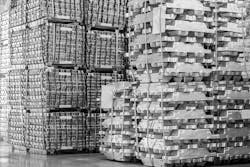Canada Retaliates for New U.S. Aluminum Tariffs
Canada will impose $2.7 billion in tariffs on United States imports as of September 16 in retaliation for the Trump Administration's decision to revive a 10% duty on primary aluminum imported from Canada. The amount of the Canadian tariffs is equivalent to the annual value of the U.S. tariffs, representing what the Trudeau government called a “swift and strong” response.
It's not clear what U.S. products will be targeted by the Canadian tariffs.
Deputy Prime Minister Chrystia Freeland announced the tariffs in a press conference while criticizing the U.S. action and predicting will “hurt the economic recovery on both sides of the border” during the global coronavirus outbreak.
The U.S. tariffs are to be implemented using the Dept. of Commerce's Section 232 authority, as were the previous penalties imposed in 2017 but eliminated by the subsequent U.S.-Mexico-Canada Agreement (USMCA), the trade agreement that replaced the North American Free Trade Agreement. Section 232 of the Trade Expansion Act of 1962 allows the president to adjust import levels, through tariffs or quotas.
"While seemingly narrow, this class of goods actually constitutes the largest share of Canadian aluminum exports to the United States. Assuming this 10% tariff proceeds, it could significantly impact the aluminum market, from competing U.S. producers of primary aluminum, to producers of secondary aluminum from recycled goods that could compete with imported primary aluminum, and to downstream users of aluminum across all industries," commented Augustine Lo, an international-trade lawyer.
The new U.S. tariffs are strongly opposed by The Aluminum Association, whose members include numerous manufacturers of aluminum that source primary aluminum ingot (P1020 aluminum) as raw material for aluminum rolled products, structural products, extrusions, forgings, and castings.
“We’re incredibly disappointed that the administration failed to listen to the vast majority of domestic aluminum companies and users by reinstating Section 232 tariffs on Canadian aluminum. After years of complex negotiations and hard work by government, industry and other leaders across North America to make the U.S.-Mexico-Canada Agreement (USMCA) a reality, this ill-advised action on a key trading partner undermines the deal’s benefits at a time when U.S. businesses and consumers can least afford it," stated Aluminum Assoc. president and CEO Tom Dobbins.
Pittsburgh-based Alcoa, which operates two smelters and a joint-venture operation in Canada, with a capacity of about 890,000 metric tons/year of primary aluminum, said "implementing these tariffs on a vital, free-trading partner will cause unnecessary disruption... tariffs don’t address the issue of Chinese overcapacity, which is the fundamental issue challenging primary aluminum production."
However, Century Aluminum, which operates three U.S. smelters, operating at a capacity of about 540,000 metric tons/year, said "President Trump's action demonstrates this administration's continued dedication to restoring the U.S. aluminum industry and American jobs."